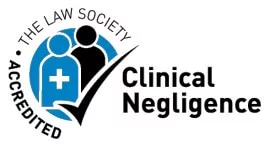NHS Claims for negligence
Understand the NHS complaints procedure and how to sue the NHS for negligence
The National Health Service (NHS) provides excellent care to millions, but when standards slip and patients suffer harm, pursuing a claim against the NHS for negligence may be necessary.
“Small but very effective and experienced team so every client benefits from the personal touch but also highly skilled litigation know-how. Capability of the team means they can handle all aspects of very complex cases as well as straightforward matters.”
Based on my experience as a specialist in medical negligence claims, I will outline the steps involved in suing the NHS for negligence, from the initial NHS complaints procedure to potential legal action.
What is NHS Negligence?
NHS negligence occurs when healthcare professionals or organisations within the National Health Service fail to meet the expected standard of care, resulting in harm or injury to a patient.
Common NHS Negligence Claims
NHS negligence claims encompass a wide range of medical errors and substandard care incidents that can occur within the National Health Service. This list outlines key areas where negligence claims are most frequently reported:
- Surgical errors
- Misdiagnosis or delayed diagnosis
- Medication mistakes
- Birth injuries
- Hospital-acquired infections
- Anaesthesia errors
- GP negligence
- Cancer misdiagnosis
- Never events (serious, preventable patient safety incidents)
Can you sue the NHS?
Yes, you can sue the NHS for negligence if you’ve suffered harm due to substandard care. To establish NHS negligence, three key elements must be present:
- A duty of care owed to the patient
- A breach of that duty
- Harm directly resulting from the breach
The NHS Constitution supports feedback and complaints
The NHS Constitution is written by the Government, laying out the core principles and values of the NHS in England. It sets out the rights of patients and staff and the responsibilities that the public, patients and staff owe to one another. The aim is to ensure that the NHS operates fairly and effectively.
The Constitution also acknowledges that the NHS is not perfect and that sometimes things can go wrong. To this end, the Constitution provides information on how to make a complaint about NHS services, care and treatment and what to expect when making a complaint. In general terms:
- You can complain verbally or in writing.
- You have the right to have your complaint acknowledged quickly and explored thoroughly and then to be informed of the outcome.
- You should be treated fairly and with respect.
- Your care will not be adversely affected because of making a complaint.
- You should be afforded the opportunity to discuss your complaint with a complaints manager and expect appropriate action to be taken.
- Finally, you can claim compensation if you have been harmed by negligence.
Who can make a complaint about the NHS?
Anyone who has received services from the NHS and has been affected by an action, omission or decision made by the NHS can make a complaint. You can also complain on behalf of someone who has died, someone who cannot make the complaint due to mental or physical incapacity, or if the person affected is a child or an adult who has asked you in writing to act for them. Generally, a person under 18 can make a complaint on their behalf if they can.
Time limit to claim against NHS
It is generally held that complaints should be made within 12 months of the event or within 12 months of you finding out about the problem. The time limit means that you should start the complaints process as soon as possible.
How to sue the NHS for negligence?
Before suing the NHS for negligence, patients should first follow the established NHS complaints procedure. This initial step allows for potential resolution without resorting to litigation. The complaints process can provide valuable insights and evidence regarding potential negligence. If the complaint doesn’t satisfactorily address the issue, patients may then consider seeking financial compensation through legal channels. Suing the NHS involves formal court proceedings, which should be viewed as a last resort after exhausting other avenues.
Before the NHS complaints procedure: The first port of call
Once an issue comes to light, it is in everyone’s best interests to have it resolved as soon as possible. So, your first port of call should be to someone directly involved – either the NHS staff member concerned or if that is not possible or helpful, the person in charge, such as the ward manager or practice manager. If your complaint is not dealt with to your satisfaction or a problem that cannot be easily solved right away, you should consider following the formal NHS complaints procedure.
Step 1 of the NHS complaints procedure: local resolution
NHS services are provided in a wide variety of settings and by a wide variety of staff, including GPs, hospitals, dentists, pharmacists, district nurses, and public health organisations. If you have cause to complain about the service you received from the NHS there are two main routes that you can take: you can either complain to the healthcare provider or the commissioner of the healthcare service that you received. Your first step should be to obtain a copy of the organisation’s complaint procedure, which will advise you on the best way to get your complaint handled appropriately and in a timely fashion.
To support your formal complaint, keeping records: of dates, times, and people you have spoken to is a good idea. Have a clear idea of who or what your complaint is about and what you would like done to help resolve the issue.
If you are unhappy with the care that you or someone else has received while in hospital you should lodge a formal complaint in writing to the Chief Executive at the NHS trust.
Letter of Complaint
Your letter of complaint must contain as much information as possible including your full contact details, date of birth, the name of the consultant in charge of your care, your admission date, discharge date and details of your complaint and your injury.
PALS compliant
If you are unsure or not confident in proceeding alone, you can get support you can contact Patient Advice and Liaison Services (PALS) who will assist you through the NHS Complaints process. This support is free, independent and completely confidential.
Additionally, you can get support from the NHS Advocacy Service.
Meeting with the hospital
If you remain dissatisfied with your care and the NHS Trust’s response to your complaint you should arrange a face-to-face meeting with the NHS Trust to discuss your concerns in detail.
You should attend the meeting with someone, who can offer you support and listen to what is being said. The hospital will let you know who will be attending the meeting beforehand. Minutes will be taken at this meeting and you are entitled to a copy of these minutes and also copies of your medical records. The minutes may be in paper format or recorded onto a CD disk.
Step 2 of the NHS complaints procedure: Health Service Ombudsman
If your complaint has not been dealt with to your satisfaction with local resolution, you are entitled to complain to the Parliamentary & Health Service Ombudsman (PHSO). The Ombudsman is independent of the NHS and will cost you nothing to make a complaint there.
You will complete a form which provides the Ombudsman with all the information required. You will give details on what happened, who was involved, and the event’s impact. You should also include copies of any relevant documents with the form and indicate what you hope to achieve with your complaint: this could include receiving an apology, changing practice to avoid a similar problem happening again, an investigation and explanation of what happened and why it happened, or any other outcome you feel would help.
Most of the time the PHSO will not investigate a complaint unless it has already been made to the hospital and all options of resolution have been explored. The PHSO has consultant nursing and medical staff who will provide expert clinical opinion and will assist the PHSO in making any recommendations to the hospital in the event that they decide to take up your case.
The PHSO contact details are:
- The Parliamentary and Health Service Ombudsman, Millbank Tower, Millbank, London, SW1P 4QP
- Telephone helpline: 0345 015 4033
- E-mail: phso.enquiries@ombudssman.org.uk
- Website: www.ombudsman.org.uk
The Ombudsman may take time to investigate your complaint and at this point, you may wish to seek legal advice on the merits of pursuing a medical negligence claim.
Financial compensation for NHS clinical negligence
No matter the outcome of the NHS complaints procedure, financial compensation is only available through legal action. In order to claim compensation, you should speak to a solicitor as soon as possible, as there is usually a time limit of 3 years. However, the official NHS complaint process should be concluded before a claim for negligence is made, as the complaint response may help determine if negligence was a factor.
To learn more, visit our article on NHS compensation payouts.
What if the complaints procedure does not resolve the issue?
You may feel that a complaint is not enough to redress the mistake made and may decide to bring a claim for financial compensation. For many people bringing a compensation claim is not something they want to do but becomes a necessity because they have suffered injury, loss and damage following a medical mistake. You may pursue a claim for negligent medical care if you are over 18. There is a time limit of 3 years from the date of the alleged negligent treatment or three years from the date you knew that you had suffered negligent medical treatment. You should, therefore, consult a solicitor in good time as the law in this area is complicated.
If you are under 18, an adult will have to seek legal advice on your behalf. The deadline for pursuing a claim is the date of your 21st birthday.
The Personal Representatives of a deceased person may also bring a claim on behalf of their estate. A claim must be pursued within 3 years from the date of death.
But it may not be negligent
The treatment you received may not have been satisfactory, but this does not mean that the treatment was necessarily negligent. In order to claim compensation, you must be able to prove negligence, which means you must show on the balance of probabilities that the treatment you received fell below standards which are considered to be acceptable by a responsible body of doctors in that field and that this inadequate care directly caused or worsened your illness or injury.
If you choose to consult with a solicitor, they can tell you if they believe you have reasonable prospects of satisfying both tests.
If you are considering bringing a claim in negligence following a medical mistake, you should consider that there will potentially be a number of steps involved before the claim concludes, for example:
- Providing medical records to your solicitor (or giving them authority to apply for them on your behalf) so that they can review them to ascertain exactly what may have gone wrong during your treatment and the injuries or illness you have suffered as a result;
- Attending appointments with medical experts that your solicitor has instructed;
- Providing a witness statement of what happened and how this has affected you;
- Family, friends or colleagues may also need to give statements, and if you are bringing a claim on behalf of a deceased person, you will likely need to provide a statement;
- Provide evidence of any financial losses you have suffered, for example, any lost earnings if you have been unable to work, medical expenses, travel expenses you would not have otherwise incurred and aids and equipment you may have had to purchase;
- Potentially meeting with a barrister;
- You may have to attend court, though this is very rare.
Although for many bringing a claim gives a sense of closure and provides some financial security, bringing a claim isn’t for everybody. For many people having a formal complaint investigated and receiving a satisfactory response is enough to allow closure and to enable them to move forward with their lives.
Experienced NHS claim solicitors
If you are concerned about your NHS care, we are here to help with no-win no no-fee NHS claims. A no-win no no-fee claim, also known as a Conditional Fee Agreement (CFA), means you won’t pay any upfront legal costs or fees if your case is unsuccessful. Our team offers:
- Free initial consultation
- Expert advice on the NHS Complaints procedure
- Evaluation of your case for potential compensation claims
We’ll guide you through the process, ensuring you understand your options after completing the NHS Complaints procedure. Let us help you and seek the resolution you deserve.
To speak with one of our solicitors, contact us by:
- Filling in our online enquiry form; or
- Calling us on 020 7485 8811
Contact us about suing the NHS
Call us 020 7485 8811
Email us Send us an email and we’ll get back to you
FAQs on NHS claims for negligence
Is it worth complaining about the NHS?
Yes. Complaining helps improve healthcare services, holds medical providers accountable, and provides an opportunity for personal resolution.
The NHS has a structured complaints procedure that allows patients to share concerns without risking future care quality. Moreover, successful complaints contribute to a learning culture within the healthcare system, potentially preventing similar issues for other patients.
Your complaint is a constructive way to address substandard care, ensuring the NHS maintains high-quality standards and learns from patient feedback.
How long does the NHS have to respond to a complaint?
You should receive a response to your letter of complaint by way of an initial acknowledgement and thereafter you should receive a full written response within 23 – 25 working days. You may have to chase the NHS Trust for this response.
Can I make a complaint on behalf of someone else?
Yes, you can complain on behalf of:
- someone who has given you written consent to act on their behalf
- someone who cannot make the complaint due to mental or physical incapacity
- a child, or
- as discussed below, some who has died.
Can I complain on behalf of a person who has died?
You can also make a complaint on behalf of a deceased person if you are concerned about the treatment they received before their death. The NHS Trust cannot give you private details about a patient’s care unless they give permission. The duty of confidentiality also persists after a patient has died. However, the law gives some people access to a deceased person’s medical information if they are the appointed Personal Representatives of the deceased’s Estate.
- To learn more, visit our article on fatal medical negligence claims.
Will making a complaint affect my future NHS care?
No, your care and treatment should not be adversely affected by making a complaint. The NHS encourages feedback to improve services, and you have the right to voice concerns without fear of negative repercussions.
NHS claims client storiesVIEW ALL
- 12.9.2024
Great Ormond Street Hospital Negligence & How to Claim
Review of negligence at Great Ormond Street Hospital At Osbornes Law, we’ve supported families through some of the most...
Read more - 18.5.2021
Seven figure settlement for brain injury
Introduction to the case Our client, F sustained a brain injury leaving her with severely impaired mobility and wheelchair dependent....
Read more - 18.5.2021
Chelsea & Westminster Hospital surgical negligence claim
£100,000 compensation for client injured during surgery Our medical negligence solicitors were instructed to pursue a claim against Chelsea & Westminster...
Read more - 6.11.2020
Review of poor maternity care at Basildon Hospital
At Osbornes our specialist medical negligence solicitors represent a number of women who have been affected by poor maternity care...
Read more - 13.11.2019
Fatal Claim against West London NHS Trust
Claim Against West London NHS Trust Case Overview I recently acted in a fatal medical negligence claim against West London...
Read more













